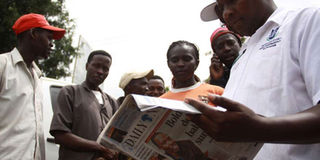Why reporters shouldn’t rely on blind men touching an elephant

A resident of Nandi County reads a copy of the Daily Nation on November 22, 2016 at Meteitei Trading Centre. The accuracy of a story rests on the credibility of the sources of the information. PHOTO | JARED NYATAYA | NATION MEDIA GROUP
What you need to know:
- Students of journalism are taught to be always alert to sources that may be biased, ignorant or incompetent.
- Prof Muune says the report is misleading and confusing and does not enable one to fully understand just what exactly happened.
The Asian folktale of blind men gathered around an elephant, and its various versions, can sometimes be useful in discerning the inaccuracy of a news story.
The accuracy of a story rests on the credibility of the sources of the information and how authoritative and reliable they are.
Are the sources like the “blind men touching an elephant”?
Do the sources have expertise, competence, authority or direct knowledge of the information they are giving the reporter?
ACCURACY OF STORIES
Students of journalism are taught to always ask tough questions and check background and contextual information so as to tell the full story and to establish the accuracy of the story.
They are taught to be always alert to sources that may be biased, ignorant or incompetent.
They are warned that if they do not observe those essential steps of sourcing, they could end up reporting stories not unlike those told by the blind men gathered around an elephant, such as the man who, holding on to the tail, confirms that “an elephant is like a rope”.
ACCOUNT OF CRASH
This brings me to a complaint I received from Prof Caxton Muru Muune, director of Africa Road Safety Services Limited, a commercial road safety management organisation.
He complains that the Daily Nation’s report of the Tuesday accident on the Nairobi-Mombasa highway that killed 23 people on the spot contains wrong and inconclusive information and “contradicting accounts by the police, survivors and witnesses”.
The story quotes police saying the bus was overtaking and the driver crashed head-on into a fuel tanker when he tried to return to his lane, and that the bus rolled and landed on its side.
“This is wrong because the impact was on the left side of both vehicles, otherwise it would have been on the right side of the vehicle. Hence, the driver did not try to return to his lane on the left side of the road,” Prof Muune says.
SURVIVORS
Further he says: “The bus could not have rolled over because the back roof is still intact.
"If it had rolled over the roof would have collapsed and passengers on the right side would also have suffered much worse injuries.
"What seems plausible is that the vehicles sideswiped from the passenger side of the two vehicles.
These observations are corroborated by the accounts of survivors and location of injuries they suffered.
For example, Edward Ngala recounts a loud bang and thought it was tyre burst before the drive hit the ‘body’ of the trailer.
He sustained injuries in the abdomen, thighs and knees. Nebert Luvari, another survivor on the right of the bus, was covered in blood on the seat next to the back row, which is consistent with sideswiping accident.
“These accounts show the bus could not have rolled, otherwise Edward and Nebert would have been tossed about inside the cabin.
"Also windows on the right side would have been broken, together with whole body being damaged almost evenly across both sides of the bus, though it is still not quite clear if the tyre burst before and/or during the accident.”
CROSS-CHECK INFORMATION
Prof Muune says the report is misleading and confusing and does not enable one to “fully understand just what exactly happened”.
He concludes that the issue is the inability, incompetence, indifference, ignorance, or sheer laxity of the correspondents to carry out proper sourcing.
They did not cross-check the information or make independent observations by “deeper interrogation and examination of the accident scene and vehicles”.
He says the correspondents did not do “background counter-checks to either reinforce and/or refute the statements” made by the police and witnesses.
They did not bring in “expert opinion to provide the correct information in the report to help in the search of the solution from better identification of facts of the accident”.
He further concludes: “Sadly, this illustrates the deepening culture of personality-based news sourcing and too much reliance on the official feeds without due diligence in the background checks, which has turned the media houses into amplifiers and promoters of official lines and spins.”
Send your complaints to the [email protected]. Text or call 0721989264




